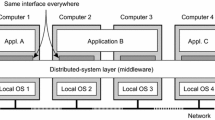Abstract
Divisible load theory is a methodology involving the linear and continuous modeling of partitionable computation and communication loads for parallel processing. It adequately represents an important class of problems with applications in parallel and distributed system scheduling, various types of data processing, scientific and engineering computation, and sensor networks. Solutions are surprisingly tractable. Research in this area over the past decade is described.
Similar content being viewed by others
Author information
Authors and Affiliations
Rights and permissions
About this article
Cite this article
Bharadwaj, V., Ghose, D. & Robertazzi, T.G. Divisible Load Theory: A New Paradigm for Load Scheduling in Distributed Systems. Cluster Computing 6, 7–17 (2003). https://doi.org/10.1023/A:1020958815308
Issue Date:
DOI: https://doi.org/10.1023/A:1020958815308




